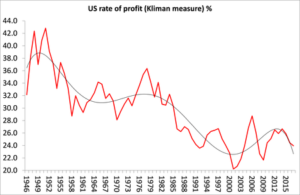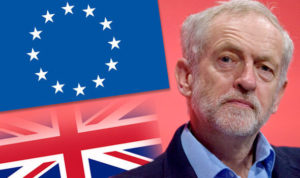
None of the Brexit three options will achieve any kind of consensus; any of them could happen.

The British political system has been thrown into turmoil since the summer of 2016, when a narrow majority of voters supported a referendum in favor of Britain leaving the European Union (EU). The Conservative Party government headed by Prime Minister . . .

The law of the tendency for the rate of profit to decline has been the focus of an immense and on-going debate since the publication of Vol.III of Capital in 1894. In what follows, . . .

In 2019, the World Bank (WB) and the IMF will be 75 years old. These two international financial institutions (IFI), founded in 1944, are dominated by the USA and a few allied major powers who work to generalize policies that . . .

The election of a new government should be a time of celebration. 25 years since the end of Apartheid should be the time of immense celebration. Yet, 25 years since the “dawn of democracy” and South Africans are engulfed by . . .

Recently in the Marxist Sociology blog, David Kotz, Professor Emeritus of Economics and Sheridan Scholar at the University of Massachusetts Amherst and Distinguished Professor in the School of Economics at the Shanghai University of Finance and Economics offered an explanation as . . .

“Liberal democracy is crumbling.” A Harvard Law Professor opened a recent talk with this matter-of-fact statement and the audience readily murmured its assent.
The daily headlines certainly seem to confirm this assessment—that we are a nation in crisis. Yet, the nature . . .

Fully Automated Luxury Communism (FALC) was a slogan in search of a movement, and now it has its manifesto. The aim: to accelerate capitalism’s positives (technological progress), curb its negatives (neoliberal globalisation), and to re-invent communism for the coming Age of Affluence.

This blog post is based on a presentation on chapters 2 and 8 of Terry Eagleton’s Why Marx Was Right to the Lower Manhattan DSA Branch Political Education meeting, May 14, 2019.
Milton Berle, the 1950s television comic superstar, had a . . .

The Green New Deal (GND), drawn up by Congresswoman Alexandria Ocasio-Cortez and Ed Markey, is the most ambitious and comprehensive program to deal with climate change ever made by political representatives to Congress and the U.S. public. It calls for . . .

With the recent announcement of Prime Minister Theresa May’s pending resignation, and the general chaos surrounding Brexit and British governance, New Politics has decided to offer a preview of a lengthier article which . . .

The foul, brutal hands of U.S. imperialism and its allies are tightening around Venezuela, and there is a strong possibility that a far-right takeover will occur in the near future. This would extinguish the last vestiges of the left-of-center Pink . . .

Stories have a life of their own. Merriam-Webster describes a meme as “an idea, behavior, style, or usage that spreads from person to person within a culture”. It doesn’t matter who the carrier of the meme is or the way that they pass it on: all that matters is that the story is reproduced and given new life with each telling.

Cuba has not been at the center of world attention for a long time, particularly after the collapse of the Soviet bloc considerably diminished the island’s importance to US imperialism. For the international left, political developments in other Latin American . . .

Jeremy Corbyn and the UK Labour Party leadership have dragged their feet on taking a clear oppositional stance on Brexit. While the Party has shifted slowly towards a position of, perhaps, supporting a People’s Vote, its entire approach since the 2016 referendum result has been one of feet dragging and equivocation.

In his scathing, Sturm und Drang takedown of the 1851 French dictatorial coup, The 18th Brumaire of Louis Napoléon, Marx remarks that history repeats twice: “the first time as tragedy, the second time as farce.” Thus when Luther pit himself . . .

The New York Times (1/22/19) reported on a bleak letter by the billionaire investor Seth Klarman that was circulated at the World Economic Forum in Davos. The letter warns about the coming financial crisis amid increased levels of social . . .

What is Post-Modern Conservatism: Essays on Our Hugely Tremendous Times is going to be released later this year by Zero . . .

Venezuela has made headlines in the last few weeks, as Venezuelan opposition leader and National Assembly head Juan Guaidó has declared himself interim President, throwing the country into turmoil. Current President, Nicolás Maduro has called the effort a coup. Meanwhile, . . .

In South Africa ten members of a militant shack dwellers organisation have been assassinated in the past six years. Yet many progressive organisations have distanced themselves from these militants. Jared Sacks exposes the complicity of a mainstream NGO that could have played an important role defending the movement against these political assassinations. Sacks argues that when movements refuse co-optation, repression, including assassination, become necessary to maintain power.